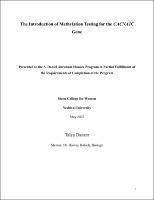Please use this identifier to cite or link to this item:
https://hdl.handle.net/20.500.12202/8044| Title: | The Introduction of Methylation Testing for the CACNA1C Gene |
| Authors: | Babich, Harvey Danzer, Talya |
| Keywords: | methylation gene methylation psychiatric disorders bipolar disorder CACNA1C gene |
| Issue Date: | May-2022 |
| Citation: | Danzer, T. (2022, May). The Introduction of Methylation Testing for the CACNA1C Gene (Undergraduate thesis, Yeshiva University). |
| Series/Report no.: | S. Daniel Abraham Honors Student Theses;May 2022 |
| Abstract: | One in four adults are diagnosed with a psychiatric disorder. Psychiatric genetic counseling, a rather new discipline of genetic counseling, assesses the familial history of a mental illness and analyzes the risk to transmit the psychiatric disorder to offspring. Psychiatric disorders are controlled by a multitude of genes, i.e. are polygenic, and are mediated by several environmental parameters, i.e., are multifactorial, including, but not limited to, trauma, stress, abuse, smoking, and maternal physical or mental illness during pregnancy. Due to the complexity of their etiologies, there are no genetic tests specific for psychiatric disorders. This manuscript proposes using gene methylation, a mechanism for gene silencing or inactivation, as a marker for psychiatric disorders, with the CACNA1C gene as the model. The CACNA1C gene encodes for the alpha subunit of the CaV1.2, an L-type voltage-gated calcium ion channel, which controls the calcium ion flow into neurons of the brain. Methylation at the promoter of the CACNA1C gene inactivates the gene which negatively affects both brain functionality and an individual’s electrochemical balance. Methylation of the CACNA1C gene is a risk factor in bipolar disorder and schizophrenia, as this negatively affects brain development. Transgenerational inheritance of traumatic stress, as shown in the offspring of Tutsi women in the Rwanda genocide experience, involved inheritance of a methylation imprint. Acknowledging the role of methylation as a transgenerational epigenetic mechanism in inheritance, it is suggested that gene methylation be used by the genetic counselor as a biomarker to screen for psychiatric disorders, using the CACNA1C gene as the model. Furthermore, utilizing gene therapy protocols, e.g., CRISPR-Cas9. elimination of methylation from the CACNA1C gene, either in germline cells, the zygote, or in cells of the early embryo, would decrease the likelihood of transmitting/inheriting a psychiatric disorder. Another approach to lessen the transmission of psychiatric disorders due, in part, to gene methylation, would be pharmaceuticals, such as DNA methyltransferase (DNMT) inhibitors. |
| Description: | Undergraduate honors thesis / Open Access |
| URI: | https://hdl.handle.net/20.500.12202/8044 |
| Appears in Collections: | S. Daniel Abraham Honors Student Theses |
Files in This Item:
| File | Description | Size | Format | |
|---|---|---|---|---|
| Danzer 2022AMay OA The Introduction of Methylation Testing for the CACNA1C Gene.pdf | 2.12 MB | Adobe PDF |  View/Open |
This item is licensed under a Creative Commons License

